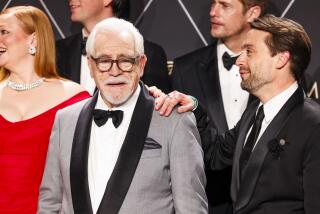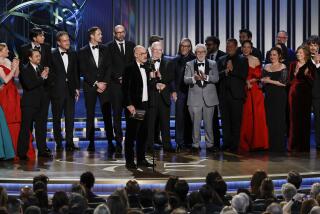‘Parade’s End’ review: Cumberbatch, Hall’s opposites attract
Before you watch HBO’s new miniseries “Parade’s End,” here’s a little advice.
Close your eyes and imagine Benedict Cumberbatch’s icy hot “Sherlock” and all the good folks at “Downton Abbey.” Now picture them disintegrating, down to the molecular level. A love for them may have drawn you to this five-part adaptation of Ford Madox Ford’s Edwardian-period novels in which Cumberbatch stars, but any preconception of this television viewing experience will only send you down the wrong path, where you may flounder among the greenery and miss something important and possibly wonderful happening on screen.
According to the website of the BBC, which produced the series in conjunction with HBO, “Parade’s End” is an “Edwardian period drama about a man’s destructive marriage with a cruel socialite.” Do not be fooled; it is nothing of the kind. Adapted by Tom Stoppard, “Parade’s End” deals with shifting social mores in an era of great social, economic and political change, but mostly it is a study of opposing forces: the tyranny and decency of honor, the enduring power and final inadequacies of real love, the necessity of regret.
IN CASE YOU MISSED IT: Oscars 2013 | Highlights
More a series of linked vignettes than traditional narrative and studded with breathtaking performances, “Parade’s End” is as eccentric as its characters. At times maddeningly slow, the story relies on dialogue of haiku-like brevity; key bits of back story and character insight are revealed in passing, and never mentioned again. Reverence and satire, sentiment and fatalism, all jostle one another for control of the story.
But “Parade’s End” must be taken on its own terms, because it is offering something rare and provocative: a poetically precise consideration of what it means to be caught out of time, clinging to the lip of one era or reaching desperately for a foothold in the other. It’s an evergreen theme grown recently popular since the instant iconization of “Mad Men” but never has it been presented with jarring loveliness — the scenery and costumes are sumptuous but the characters stutter and stumble and miss all their cues because the cues have either changed or no longer make sense.
The son of a nobleman, with his roots in Yorkshire where stands the magnificent Groby Hall, Christopher Tietjens (Cumberbatch) fancies himself the last true Tory. Though brilliant and essentially kind, Tietjens embraces the straitjacketed ways of the old code; in a trick of muscle or makeup, Cumberbatch has made his upper lip so stiff it is, at times, difficult to understand what he’s saying.
Yet passion lies beneath perfection and when he encounters the ravishing Sylvia (Rebecca Hall), Tietjens is suddenly, and uncharacteristically, consumed. When she reveals she is pregnant, possibly by him, possibly not, Tietjens marries her, despite the fact that she’s a “papist” and his complete and utter opposite. Muttering the appropriate apologies for a hurried Paris wedding and the possibility of Groby being inherited by a son not of his blood, Tietjens allows himself the luxury of a single word — “glorious” — to acknowledge the possibility that the marriage might be something other than duty.
Far from a “cruel socialite,” Hall’s Sylvia is easily Tietjens’ equal, in force and stature. But where he is mind, she is body; where he is control, she is chaos. Where the times are changing too fast for Tietjens, they are not changing fast enough for his wife. As Sylvia, Hall delivers a performance of staggering beauty, creating a woman of modern sensibility and appetite tied to a man she both admires and loves but whom she cannot reach. Rhett and Scarlett have nothing on Sylvia and Christopher, who eye each other greedily while speaking words that might as well be in two different languages.
Oscars 2013: Quotes | Red carpet | Backstage | Fashion | Timeline
Although Tietjens is the story’s central character, Sylvia is its driving force, an utterly new sort of female character who laughs when she should flounce, challenges when she should melt and insists on remaining precisely who she is even if it means she cannot have what she wants. You do not want to miss a single word she says.
When she is not on screen, the story burbles along through subplots involving Tietjens’ other relationships — with his colleagues at the Imperial Department of Statistics, with his unloving father and rakish but judgmental brother (Rupert Everett); with his best friend, the aspiring poet Macmaster (Stephen Graham), and finally with the lovely Valentine Wannop (Adelaide Clemens), a young suffragette who steals Tietjens’ heart.
All manner of terrific actors in splendidly eccentric roles wander in and out of the story — Janet McTeer plays Sylvia’s mother, who has an alarmingly frank grasp of the whole situation; Miranda Richardson is Mrs. Wannop, a hilariously self-centered lady novelist; Roger Allam’s General Campion is one of the true old guard, absurd and essential, and Rufus Sewell is the Rev. Duchemin, a man driven mad, perhaps, by the repressions of his times.
The Great War breaks out, as it inevitably does in stories of this period, and when the action moves to the front, things get odd to the point of avant-garde. But when the smoke clears, it is a simple enough story. For all the hysteria of this class or that era, people find their way and the world hasn’t ended yet.
But even if it should, it would be worth taking a few moments before the final collapse, to watch Cumberbatch and Hall remind us of the real and complicated meaning of “chemistry.”
---
‘Parade’s End’
Where: HBO
When: 9 and 10 p.m. Tuesday and Wednesday; 9 p.m. Thursday
Rating: TV-MA (may be unsuitable for children under 17)
PHOTOS, VIDEOS & MORE:
PHOTOS: Behind the scenes of ‘Downton Abbey’
VIDEO: Winter TV preview
PHOTOS: Violence in TV shows
More to Read
The complete guide to home viewing
Get Screen Gab for everything about the TV shows and streaming movies everyone’s talking about.
You may occasionally receive promotional content from the Los Angeles Times.







